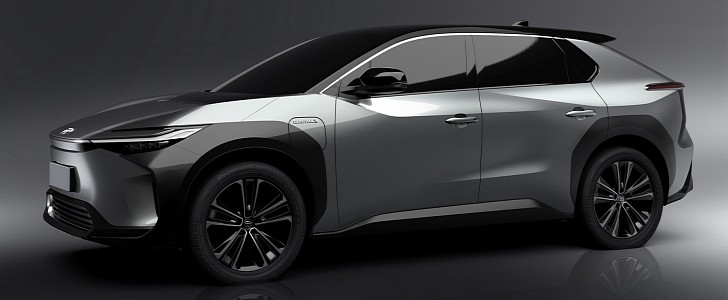Toyota is making a worldwide recall involving approximately 2,700 units of its first mass-produced electric vehicle, the bZ4X. Predictably, it also affects the Subaru Solterra, bZ4X’s twin brother from another mother, with around 2,600 EVs. The repair has nothing to do with the fact that the bZ4X is electric. In fact, it is way duller than it may seem: it relates to a hub bold that may go loose, which raises the risk of a wheel coming off the electric SUV.
Toyota said it did not hear about any cases in which that happened, probably because a single bolt going loose in a wheel that is held in place by five bolts is not that much of an issue. If that happens to more bolts in a single wheel, then that is worrisome. Toyota did not reveal if that is the case. The Japanese automaker only decided to act immediately, which was a wise decision. The sooner it fixed the problem, with only 2,700 cars on the streets, the cheaper it will be to get things settled.
According to Reuters, 2,200 of these 2,700 vehicles were in Europe, 260 in the U.S., 110 in Japan, and 20 in Canada. The numbers do not match: we get only 2,590 units of the 2,700 cars affected by the problem. All the vehicles recalled in Japan were with dealerships, not with customers. They were being used to present the bZ4X.
Toyota apologized and said it planned to repair the vehicles sooner. However, it was still investigating the details. Considering the issue emerges in sharp turns and sudden braking, it may have to do with the added weight of electric cars. Solving it could go from tightening the bolts harder to replacing them with stronger parts that accept more torque.
GM engineers in Brazil used to tell an interesting tale about that. While the Chevrolet Vectra always had problems with its suspension, the Toyota Corolla faced the bad Brazilian asphalt without any issues. GM bought a Corolla to understand how Toyota did the trick and discovered that its suspension had more expensive bolts that could endure more torque than those in the Chevrolet sedan.
By spending a bit more on the suspension bolts, Toyota saved warranty expenses associated with tightening the suspension. The Japanese carmaker may have just discovered that electric cars and their higher mass may also demand stronger bolts in the wheels.
According to Reuters, 2,200 of these 2,700 vehicles were in Europe, 260 in the U.S., 110 in Japan, and 20 in Canada. The numbers do not match: we get only 2,590 units of the 2,700 cars affected by the problem. All the vehicles recalled in Japan were with dealerships, not with customers. They were being used to present the bZ4X.
Toyota apologized and said it planned to repair the vehicles sooner. However, it was still investigating the details. Considering the issue emerges in sharp turns and sudden braking, it may have to do with the added weight of electric cars. Solving it could go from tightening the bolts harder to replacing them with stronger parts that accept more torque.
GM engineers in Brazil used to tell an interesting tale about that. While the Chevrolet Vectra always had problems with its suspension, the Toyota Corolla faced the bad Brazilian asphalt without any issues. GM bought a Corolla to understand how Toyota did the trick and discovered that its suspension had more expensive bolts that could endure more torque than those in the Chevrolet sedan.
By spending a bit more on the suspension bolts, Toyota saved warranty expenses associated with tightening the suspension. The Japanese carmaker may have just discovered that electric cars and their higher mass may also demand stronger bolts in the wheels.





































